Regioselectivity - Study guides, Class notes & Summaries
Looking for the best study guides, study notes and summaries about Regioselectivity? On this page you'll find 33 study documents about Regioselectivity.
All 33 results
Sort by
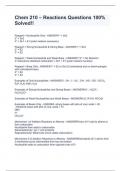
-
Chem 210 – Reactions Questions 100% Solved!!
- Exam (elaborations) • 6 pages • 2024
- Available in package deal
-
- $11.99
- + learn more
Reagent = Nucleophile Only - ANSWER1° = Sn2 2° = Sn2 3° = Sn1 + E1 (polar medium necessary) Reagent = Strong Nucleophile & Strong Base - ANSWER1° = Sn2 2° = E2 3° = E2 Reagent = Weak Nucleophile and Weak Base - ANSWER1°/2° = No Reaction 3°/resonance stabilized carbocation = Sn1 + E1 (polar medium necessry Reagent = Base Only - ANSWER1° = E2 or Sn2 (if unhindered and no beta-hydrogen with unhindered base) 2° = E2 3° = E2 Examples of Only Nucleophiles - ANSWERCl⁻, ...
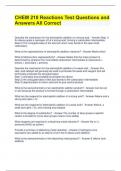
-
CHEM 210 Reactions Test Questions and Answers All Correct
- Exam (elaborations) • 3 pages • 2024
- Available in package deal
-
- $12.99
- + learn more
CHEM 210 Reactions Test Questions and Answers All Correct Describe the mechanism for the electrophilic addition of a strong acid. - Answer-Step 1) An alkene grabs a hydrogen off of a strong acid, forming a carbocation intermediate. Step 2) The conjugate base of the acid (an anion now) bonds to the open shell carbocation What is the regioselectivity of electrophilic addition reactions? - Answer-Markovnikov What is Markovnikov regioselectivity? - Answer-States that the major product is det...

-
Organic Chemistry ACS Final Exam Study Questions and Answers with Complete Solution 2024
- Exam (elaborations) • 6 pages • 2024
- Available in package deal
-
- $13.49
- + learn more
Basicity rules - -strong base: unstable/reactive (ED groups) -weak base: stable (EW groups/more EN/bigger) Chair conformation - -more stable equitorial (slanted) -pointing up/pointing down=cis if both up -elimination: trans and diaxial Newman projection - -gauche: substituent groups adjacent to eachother -grab middle and turn to put in plane Enantiomers - -not superimposable mirror images -same besides stereochemistry Diastereomers - -mirror images but one stereocenter stays and...
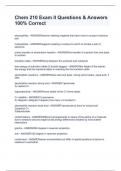
-
Chem 210 Exam II Questions & Answers 100% Correct
- Exam (elaborations) • 4 pages • 2024
- Available in package deal
-
- $11.49
- + learn more
electrophiles - ANSWERelectron seeking reagents that have room to accept a electron pair nucleophiles - ANSWERreagents seeking a nucleus to which to donate a pair of electrons proton transfer or protonation reaction - ANSWERthe transfer of a proton from one base to another transition state - ANSWERlying between the products and reactants free energy of activation (delta G double dagger) - ANSWERthe height of the barrier, the energy that the reactants attain in reaching the the transi...
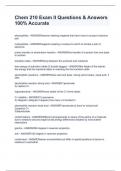
-
Chem 210 Exam II Questions & Answers 100% Accurate
- Exam (elaborations) • 4 pages • 2024
- Available in package deal
-
- $9.99
- + learn more
Chem 210 Exam II Questions & Answers 10electrophiles - ANSWERelectron seeking reagents that have room to accept a electron pair nucleophiles - ANSWERreagents seeking a nucleus to which to donate a pair of electrons proton transfer or protonation reaction - ANSWERthe transfer of a proton from one base to another transition state - ANSWERlying between the products and reactants free energy of activation (delta G double dagger) - ANSWERthe height of the barrier, the energy that the reac...
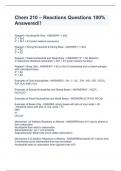
-
Chem 210 – Reactions Questions 100% Answered!!
- Exam (elaborations) • 6 pages • 2024
- Available in package deal
-
- $10.99
- + learn more
Chem 210 – Reactions Questions 100% Answered!! Reagent = Nucleophile Only - ANSWER1° = Sn2 2° = Sn2 3° = Sn1 + E1 (polar medium necessary) Reagent = Strong Nucleophile & Strong Base - ANSWER1° = Sn2 2° = E2 3° = E2 Reagent = Weak Nucleophile and Weak Base - ANSWER1°/2° = No Reaction 3°/resonance stabilized carbocation = Sn1 + E1 (polar medium necessry Reagent = Base Only - ANSWER1° = E2 or Sn2 (if unhindered and no beta-hydrogen with unhindered base) 2° = E2 3° = E...
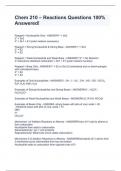
-
Chem 210 – Reactions Questions 100% Answered!
- Exam (elaborations) • 6 pages • 2024
- Available in package deal
-
- $13.99
- + learn more
Reagent = Nucleophile Only - ANSWER1° = Sn2 2° = Sn2 3° = Sn1 + E1 (polar medium necessary) Reagent = Strong Nucleophile & Strong Base - ANSWER1° = Sn2 2° = E2 3° = E2 Reagent = Weak Nucleophile and Weak Base - ANSWER1°/2° = No Reaction 3°/resonance stabilized carbocation = Sn1 + E1 (polar medium necessry Reagent = Base Only - ANSWER1° = E2 or Sn2 (if unhindered and no beta-hydrogen with unhindered base) 2° = E2 3° = E2 Examples of Only Nucleophiles - ANSWERCl⁻, ...
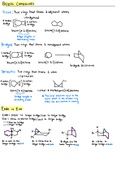
-
CHEM 215 Exam 3 Study Guide
- Summary • 10 pages • 2022
- Available in package deal
-
- $3.99
- 3x sold
- + learn more
This study guide will help you get an A on Exam 3 in CHEM 215 :) It is a summary of Exam 3 content containing colorful diagrams, drawings, and mechanisms. This study guide paired with practice problems will help any student succeed in this course. The study guide contains information from Exam 3 including: -The different types of bicyclic compounds -Endo vs exo -Diels-Alder regioselectivity and stereospecificity -Extended topics in Diels-Alder (heteroatom, inverse electron demand, intram...
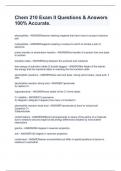
-
Chem 210 Exam II Questions & Answers 100% Accurate.
- Exam (elaborations) • 4 pages • 2024
- Available in package deal
-
- $14.99
- + learn more
electrophiles - ANSWERelectron seeking reagents that have room to accept a electron pair nucleophiles - ANSWERreagents seeking a nucleus to which to donate a pair of electrons proton transfer or protonation reaction - ANSWERthe transfer of a proton from one base to another transition state - ANSWERlying between the products and reactants free energy of activation (delta G double dagger) - ANSWERthe height of the barrier, the energy that the reactants attain in reaching the the transi...
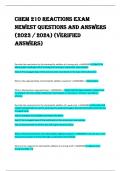
-
CHEM 210 REACTIONS EXAM NEWEST QUESTIONS AND ANSWERS (2023 / 2024) (VERIFIED ANSWERS)
- Exam (elaborations) • 15 pages • 2024
-
- $17.99
- + learn more
What is the degree of substitution? <<ANSWERS>>>The number of alkyl groups a specific carbon is bonded to (more alkyl groups means more stable) What reagents are required in a dissolving metal reduction? <<ANSWERS>>>Na or Li, ammonia (NH3) as solvent Provide a summary of dissolving metal reduction <<ANSWERS>>>2 hydrogens (one equivalent) are added to an alkyne to form the E alkene (anti addition) What is the stereochemistry of the dissolving ...

Do you wonder why so many students wear nice clothes, have money to spare and enjoy tons of free time? Well, they sell on Stuvia! Imagine your study notes being downloaded a dozen times for $15 each. Every. Single. Day. Discover all about earning on Stuvia


